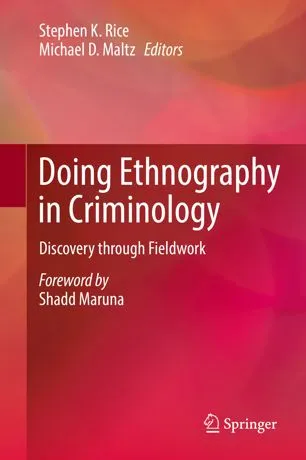Doing Ethnography in Criminology: Discovery through Fieldwork
4.5
Reviews from our users

You Can Ask your questions from this book's AI after Login
Each download or ask from book AI costs 2 points. To earn more free points, please visit the Points Guide Page and complete some valuable actions.Introduction to "Doing Ethnography in Criminology: Discovery through Fieldwork"
Ethnography has long been a fundamental methodology in understanding human behavior, particularly in the field of criminology. Stephen K. Rice and Michael D. Maltz, through their thought-provoking book "Doing Ethnography in Criminology: Discovery through Fieldwork", immerse readers in the transformative power of qualitative research. Seamlessly blending theory with practice, the book underscores the necessity and relevance of ethnographic approaches in unveiling the intricate dynamics of crime, deviance, and justice. This introduction provides a detailed summary of the book, its key takeaways, famous quotes, and a reflection on its importance.
Detailed Summary of the Book
"Doing Ethnography in Criminology: Discovery through Fieldwork" serves as both an instructional guide and a reflective compendium of insights gleaned from conducting ethnographic research in criminology. The authors guide readers through the nuts and bolts of ethnographic fieldwork, offering a rich tapestry of real-world examples, challenges, and methodologies used to explore criminal behavior, community responses to crime, and the functioning of the justice system. At its core, the book asserts that ethnography is not merely a passive observation tool but an active process of engagement and discovery.
The authors emphasize the value of "being there"—of immersing oneself in the social worlds of the people being studied. They detail a broad range of ethnographic methods, from participant observation and in-depth interviews to shadowing criminal justice practitioners. Additionally, the book contextualizes the ethical dilemmas faced by fieldworkers, from negotiating access and gaining informed consent to maintaining confidentiality and navigating one's role as both an insider and outsider to the communities studied.
Each chapter weaves together theoretical concepts with practical examples, drawing from a host of case studies and field experiences. The authors also reflect on how ethnography uniquely captures the lived experiences and perspectives of marginalized populations—voices often absent from statistical or administrative data. By prioritizing human stories over abstracted figures, ethnographic criminology reveals the subtle, often hidden dynamics of crime and justice that would otherwise remain unnoticed.
Key Takeaways
- Ethnography requires active immersion in the studied environment, lending authenticity and depth to criminological research.
- Understanding crime and justice involves bridging the gap between theory and practice through direct interaction with individuals and communities.
- Ethical considerations are central to ethnographic methods, requiring careful negotiation of boundaries, roles, and responsibilities.
- The qualitative nature of ethnography enables researchers to capture nuances and unspoken truths absent from quantitative data.
- Fieldwork in criminology empowers researchers to challenge stereotypes, confront biases, and give voice to underrepresented groups.
Famous Quotes from the Book
-
"Ethnography is not so much about finding answers as it is about asking the right questions in the right way."
-
"Criminology cannot exist in a vacuum—ethnography reminds us to ground research in the lived realities of people and communities."
-
"The field is where theory blossoms, evolves, and is sometimes disproved."
Why This Book Matters
"Doing Ethnography in Criminology: Discovery through Fieldwork" occupies a unique space in criminological literature by championing the qualitative, human-centric approach to research. In a discipline often dominated by statistical analyses and large-scale surveys, the book reminds us of the irreplaceable value of understanding lived experiences. Crime and justice are deeply rooted in social contexts, and ethnography provides the means to decipher and articulate these complexities.
The book is essential reading not only for seasoned criminologists but also for students, policymakers, and anyone interested in the realities of crime and justice beyond the numbers. It offers a practical framework for budding ethnographers while functioning as a reflective companion for experienced researchers navigating the ethical and logistical challenges of the field.
Ultimately, by prioritizing empathy, curiosity, and ethical rigor, the book underscores the transformative potential of fieldwork—not just for the researcher, but for the communities they engage with. It is a call to action for criminology to remain connected to humanity, to ground its insights in real-life stories, and to challenge the boundaries of knowledge through immersive discovery.
Free Direct Download
You Can Download this book after Login
Accessing books through legal platforms and public libraries not only supports the rights of authors and publishers but also contributes to the sustainability of reading culture. Before downloading, please take a moment to consider these options.
Find this book on other platforms:
WorldCat helps you find books in libraries worldwide.
See ratings, reviews, and discussions on Goodreads.
Find and buy rare or used books on AbeBooks.
1196
بازدید4.5
امتیاز50
نظر98%
رضایتReviews:
4.5
Based on 0 users review
"کیفیت چاپ عالی بود، خیلی راضیام"
Questions & Answers
Ask questions about this book or help others by answering
No questions yet. Be the first to ask!


